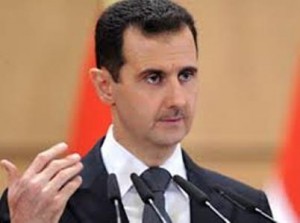 BRUSSELS � Iran could improve its chances of playing at least a limited role in the upcoming peace conference on Syria if it persuaded President Bashar al-Assad to stop the bombardment of Aleppo and allow the delivery of humanitarian aid to besieged towns and cities, senior State Department officials said on Monday.
BRUSSELS � Iran could improve its chances of playing at least a limited role in the upcoming peace conference on Syria if it persuaded President Bashar al-Assad to stop the bombardment of Aleppo and allow the delivery of humanitarian aid to besieged towns and cities, senior State Department officials said on Monday.Secretary of State John Kerry said on Sunday that in order to participate in the conference, Tehran would have to accept the talks� basic goal of planning for a Syria after the resignation of Mr. Assad, a longtime ally of Iran�s. But Mr. Kerry also said that Iran might informally �contribute from the sidelines,� even if it continued to support Mr. Assad.
�Are there ways for them conceivably to weigh in? Can their mission that is already in Geneva be there in order to help the process?� Mr. Kerry said�in his Sunday comment. �It may be that there are ways that could happen.�
Elaborating on those remarks on Monday, a senior State Department official said there were other steps Iran could take to show it was ready to help end the conflict.
�Those include calling for an end to the bombardment by the Syrian regime of their own people,� the official said. �It includes calling for and encouraging humanitarian access.�
A second State Department official suggested that Iran could make such entreaties to the Assad government privately. �Public or private, we�d take it either way at this point,� the official said.
The officials could not be identified under the State Department protocol for talking to reporters.
The Syria peace conference is being held in Geneva under the auspices of the United Nations, which will decide what role, if any, Iran might play at the meeting, in consultation with the other nations participating.
The subject of Iran�s role will also be discussed when the �London 11,� a group of nations that have been supporting the moderate Syrian opposition, convenes in Europe next week. Mr. Kerry is scheduled to attend that meeting.
The possibility of Iran playing a role in the effort is problematic, because it has supplied arms to the Assad government and has been one of the Syrian president�s staunchest backers.
Russia, which also has supported Mr. Assad, favors Iran�s participation. But France�s foreign minister said in September that Iran should not be allowed to participate�unless it first makes it clear�that it would accept an outcome in which Mr. Assad would hand over power to a transitional body. Much of the Syrian opposition is also opposed to Iran having any role.
With a few weeks to go before the conference, one of the officials rated the chances of a Iran participating as �less likely than likely.�
The issue raises broad questions about how best to manage the West�s relations with Tehran. So far, the thaw in relations between the United States and Iran has been mainly limited to the November interim agreement suspending much of Iran�s nuclear program for six months. Technical talks on how to put that interim agreement into effect are still continuing, and it is unclear whether the agreement will be the basis for a more comprehensive accord to roll back Iran�s nuclear efforts.
Though American and Iranian officials have conferred at length on the nuclear question, they appear to have engaged in only very limited discussions of other regional issues.
With Western nations and Iran backing different sides in Syria, there have been no signs of the kind of political cooperation that was seen after the Taliban were ousted in Afghanistan in 2001.
The Obama administration has insisted that Mr. Assad must give up power and has provided limited support for moderate elements among the rebels who are trying to unseat him. By contrast, Iran has flown shipments of arms and members of its paramilitary Quds force to help Mr. Assad�s forces. Iran has also encouraged Hezbollah, the Lebanese militia, to intervene on Mr. Assad�s side.
At the same time, the Syria conflict has become a source of friction between the United States and its traditional Arab partners, especially Saudi Arabia, which is worried about Iran�s influence in the region. Those tensions became more pronounced after the Assad government used chemical weapons last year, and the White House shelved plans to mount a military strike in response. Instead, the United States worked with Russia to conclude an agreement to eliminate Syria�s arsenal of poison gas. That agreement was hailed by arms control experts as a breakthrough, but it appears to have left Mr. Assad firmly entrenched in power.
Senator John McCain, the Arizona Republican who visited the Saudi capital last month, said in an interview that Saudi officials were still bitter about the Obama administration�s handling of the Syria crisis. �They were going to support whomever they thought could defeat Bashar al-Assad,� and not just groups that the United States favored, Mr. McCain recalled of the Saudis.
During his Sunday swing through the region, Mr. Kerry met for more than two hours with King Abdullah of Saudi Arabia at his desert palace at Rawdat Khuraim, a 30-minute helicopter flight from the capital, Riyadh. Mr. Kerry said afterward that the king backed his efforts to negotiate a peace accord between the Israelis and the Palestinians. �His Majesty was not just encouraging, but supported our efforts,� Mr. Kerry said.
The Saudi foreign minister, Prince Saud al-Faisal, also said that Mr. Kerry and the king had had an �excellent meeting.� But neither side offered any details about their discussions concerning three delicate issues: the situation in Syria, the coming peace conference and Iran.
By The New York Times
The Iran Project is not responsible for the content of quoted articles.










